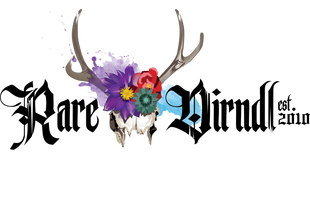German Karneval & Fasching: The BIGGEST Party in Germany!
During the winter months, there is a tradition in Germany that dates back to the 16th century and is one of the oldest German customs. Centuries older than the celebration of Oktoberfest, and to most folk's surprise, much more popular! Today, many German’s carry on this long lived tradition with parades, parties and events that draw out millions of locals and visitors to the streets.
Here in Chicago we have a German Mardi Gras club, so I have had the pleasure of celebrating the Karneval season and Fasching for many years and it's always a blast. But what is it all about? What is Fasching? What is the celebration for? Let's dive right in!

What is Fasching aka Karneval?
Fasching, also known as Karneval in Germany, is basically one big, colorful, and downright awesome party! Imagine Halloween and Mardi Gras teaming up for a cultural extravaganza. It's the German way of letting loose and embracing the spirit of fun before the more serious Lenten season kicks in. During Fasching, streets come alive with parades, elaborate costumes, a variety of different masks and a whole lot of laughter. And it is a way to chase away winter demons.When Does Fasching Start?

Why is November 11 so important?
The origin of the Elferrat dates back to the medieval period when civic and social organizations played a significant role in local governance. Over time, these groups evolved into carnival societies, and the Elferrat emerged as a council entrusted with the planning and execution of carnival activities. They act as ambassadors of merriment, ensuring that the carnival celebrations are filled with laughter and joy often including a Prinz and Prinzessin with a full court including jesters, and more.
Is Fasching and Karneval the same thing?

Yes! Different areas of Germany have different names for the event:
Karneval in the “Rheinland” (Rhineland) area
Fastnacht around the city of Mainz (‘fasting night’, or eve of Lent, the period of fasting)
Fasnet in Swabia (south-west region of Germany) and in the southwest of the state of Bavaria
Fosnat in the Franken region (northern Bavaria)
Fasching around the city of “München” (Munich) and in Austria

Fasching Season Germany
The week leading up to Lent is often referred to as the "crazy days" or "foolish days." During this time, cities and towns across Germany transform into a carnival wonderland. The streets are filled with vibrant processions featuring elaborately decorated floats, enthusiastic marchers, and, of course, the Elferrat leading the way.
Costumes become the order of the day – and night – as people of all ages don everything from whimsical outfits to political satire ensembles. It's a time when creativity knows no bounds, and you're likely to encounter everything from superheroes to historical figures to the downright absurd.

Parties and masked balls are in full swing, with music, dance, and laughter echoing through the streets. Local traditions and customs take center stage, adding unique flavors to the celebrations. In some regions, you might witness traditional Fasching plays or ceremonies that have been passed down through generations.
Let's break it down by day...
Weiberfastnacht – aka Women's Carnival. Women across Germany don colorful costumes and gather to assert their temporary command, playfully taking over the town halls in symbolic acts of mock authority. One of the quirky traditions on Weiberfastnacht involves women cutting off men's ties, a lighthearted gesture that adds a touch of hilarity to the festivities.
Rosenmontag – THIS is the REAL party! Rosenmontag, or Rose Monday, stands as the glorious pinnacle of Germany's Karneval season, marked by spectacular parades and an explosion of merriment. Falling on the Monday before Ash Wednesday, this day sees towns and cities adorned with a riot of colors and festivity. The Rose Monday parades are renowned for their elaborate floats, each a masterpiece of creativity and satire, addressing current events with a humorous twist. Revelers line the streets, donning extravagant costumes and immersing themselves in the contagious energy of the procession. It's a day when the spirit of Karneval reaches its zenith, with music, dance, and laughter echoing through every corner. Whether you're enchanted by the larger-than-life floats or caught up in the infectious joy of the crowd, Rosenmontag encapsulates the essence of German carnival celebrations in all their grandeur and revelry.

Faschingsdienstag – (Shrove Tuesday) folks are still partying, but it's beginning to slow down a bit as the clock ticks down to Ash Wednesday, the revelry doesn't fizzle out quietly; instead, it often concludes with a symbolic "burial" of a figure representing winter, marking the transition from the festive Karneval season to the more introspective period of Lent.
In essence, the week before Lent in Germany is a time when the country collectively turns into a carnival hotspot, inviting locals and visitors alike to embrace the joy, laughter, and a touch of madness that defines this spirited celebration. It's a spectacular send-off to the winter blues and a warm welcome to the reflective days of Lent that follow.
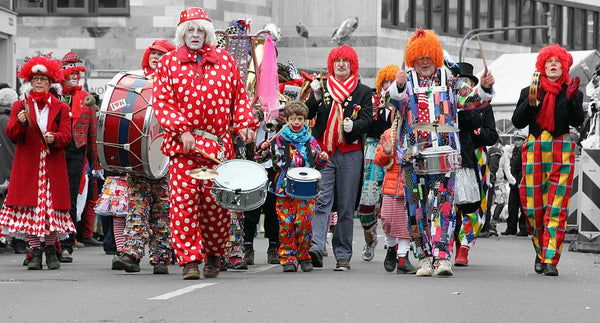
Clown-dressed marchers in Cologne’s 2014 Rosenmontag parade, the culmination of Karneval in the Rhineland. PHOTO: Wikimedia Commons
Don't forget the Karneval foods!
Fasching, being the feast of all feasts in Germany, comes with a lineup of classic and delightful foods that add a flavorful touch to the carnival celebrations. Among the must-try treats are "Krapfen" or Berliner Pfannkuchen are jelly-filled doughnuts, which practically become the unofficial symbol of Fasching. These sweet and pillowy delights are often dusted with powdered sugar, adding to their irresistible allure. Revelers also indulge in hearty dishes like "Heringsschmaus," a pickled herring salad of sorts, and various types of sausages that provide sustenance for the lively festivities. Traditional German sweets, such as "Schaumküsse" (chocolate kisses) and "Schmalzkuchen", make appearances at Fasching gatherings, ensuring that the culinary experience is as rich and diverse as the carnival itself. So, whether you're savoring the sweetness of a Krapfen or digging into savory delights, Fasching foods are an essential part of the festive gastronomic journey.
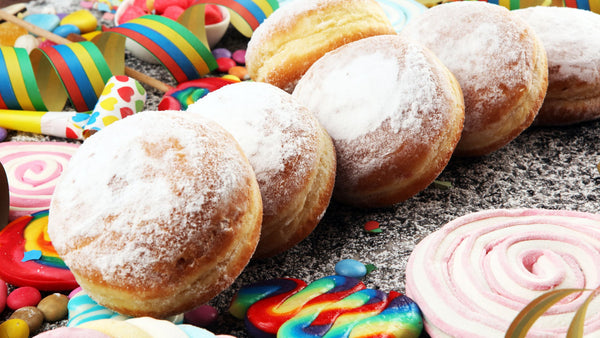
Check out these recipes for Fasching delights from some of our favorite food bloggers.
- Berliner, Krapfen, Kreppel, Pfannkuchen.. there are many words to describe the perfection that a German donut is > Here is how to make them from Dirndl Kitchen
- That unique lenten specialty Heringsschmaus > Give it a whirl!
- Another delightful little donut Schmalzkuchen > Try this from Spruce Eats
- Schaumküsse or Shokokuss are a little difficult to make > but you can buy them here
Fasching in America
In America, the Mardi Gras in New Orleans in the first thing that comes to mind when thinking of Carnival season, but there are many Karneval or German Mardi Gras Societies here in the US!
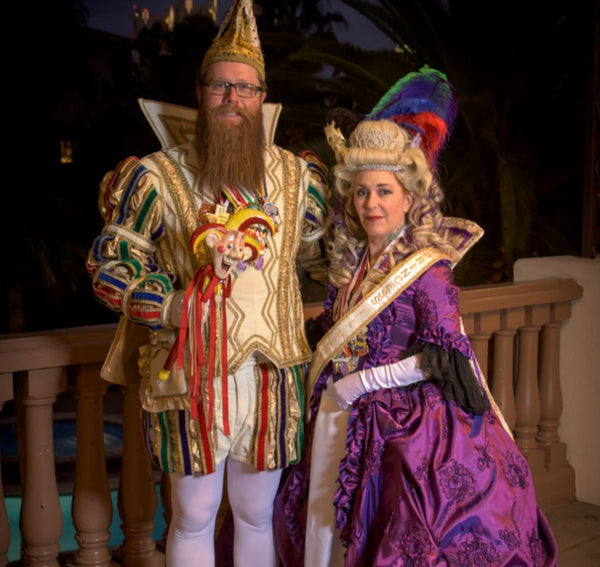
While Fasching is deeply rooted in German traditions, the United States boasts its own vibrant celebrations with organizations like GAMGA (German American Mardi Gras Association) playing a key role. GAMGA brings the spirit of Fasching to American shores, organizing lively events that mirror the exuberance of the German carnival season. In various cities across the U.S., particularly those with strong German-American communities, Fasching is celebrated with parades, costume parties, and festive gatherings. Participants don colorful costumes, masks, and enjoy music, dance, and delicious German cuisine.
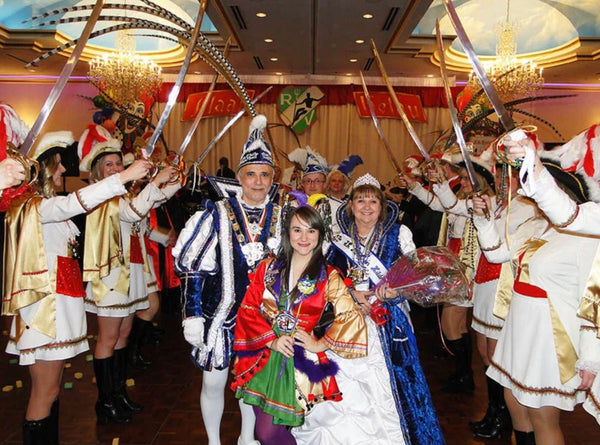
The American adaptation of Fasching embraces the essence of the German festivities, creating a cross-cultural celebration that showcases the diversity of traditions within the United States. GAMGA and similar organizations play a vital role in fostering a sense of community and shared heritage, ensuring that the lively spirit of Fasching transcends borders and becomes a cherished part of the American cultural tapestry.
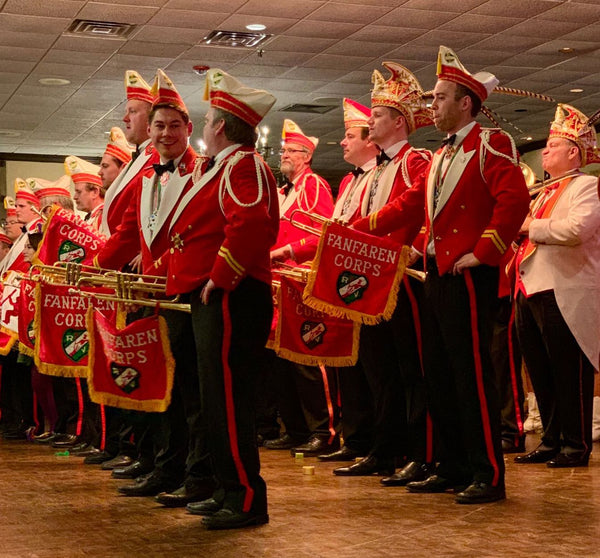
My sister and I dress up every year for the Fasching celebration here in Chicago and while we don't get to have a large parade in the streets, the evening of celebration is always a great time. Our friends and family play music as part of the Chicago Mardi Gras Society drum and bugel choir, the Rheinischer Verein Fanfahrenchor.
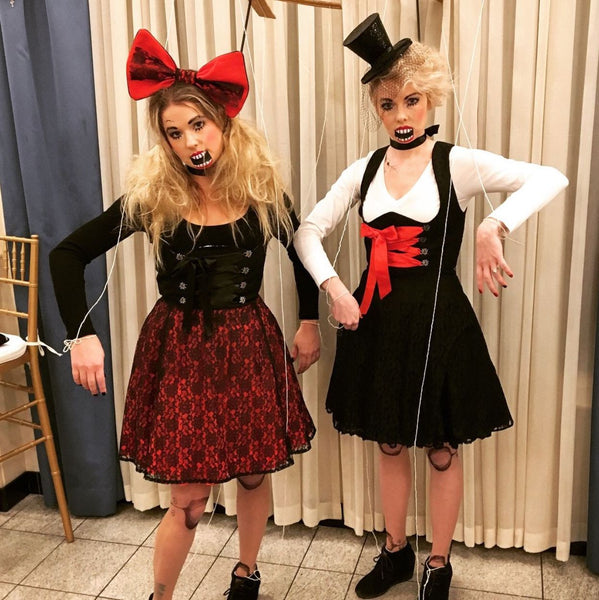
Do you celebrate Karneval or Fasching in your city? Have you been to Germany during Karneval? I'd love to hear all about in the comments, so please do share!
–
Ever wonder which dirndl style you are? Click here to take our quiz and find out now!
